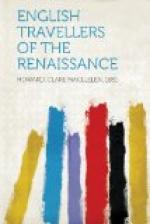“Which are the favourite herbs of the sheep of this country?”
“Are there many instances of people having been bit by mad animals?”
“Is the state of a bachelor aggravated and rendered less desirable? By what means?”
“How much is paid per day for ploughing with two oxen? With two horses?”
“Which food has been experienced to be most portable and most nourishing for keeping a distressed ship’s crew from starving?”
“What is the value of whales of different sizes?”
In addition to such inquiries Berchtold[403] urges the necessity of sketching landscapes and costumes, and better yet, the scientific drawing of engines and complicated machines, and also of acquiring skill on some musical instrument, to keep one from the gaming table in one’s idle hours, preferably of learning to play on a portable instrument, such as a German flute. Journals, it goes without saying, must be written every night before the traveller goes to sleep.
It is not only the fact of their being addressed to persons of small intelligence which makes the guide-books of the eighteenth century seem ridiculous; another reason for their ignoble tone is the increased emphasis they lay on the material convenience of the traveller. Not the service of one’s country or the perfecting of one’s character is the note of Georgian injunctions, but the fear of being cheated and of being sick. Misson’s instructions begin at once with praise of fixed rates in Holland, where one is spared the exhaustion of wrangling. The exact fare from Cologne to Maintz is his next subject, and how one can hire a coach and six horses for three crowns a day; how the best inns at Venice are The Louvre, The White Lion, and The French Arms; how one can stay at The Louvre for eight livres a day and pay seven or eight livres for a gondola by the day, and so forth; with similar useful but uninspired matter. Next he discusses sea-sickness, and informs us that the best remedy is to keep always, night and day, a piece of earth under the nose; for which purpose you should provide a sufficient quantity of earth and preserve it fresh in a pot of clay; and when you have used a piece so long that it begins to grow dry, put it again into the pot, and take out some fresh earth.[404]




